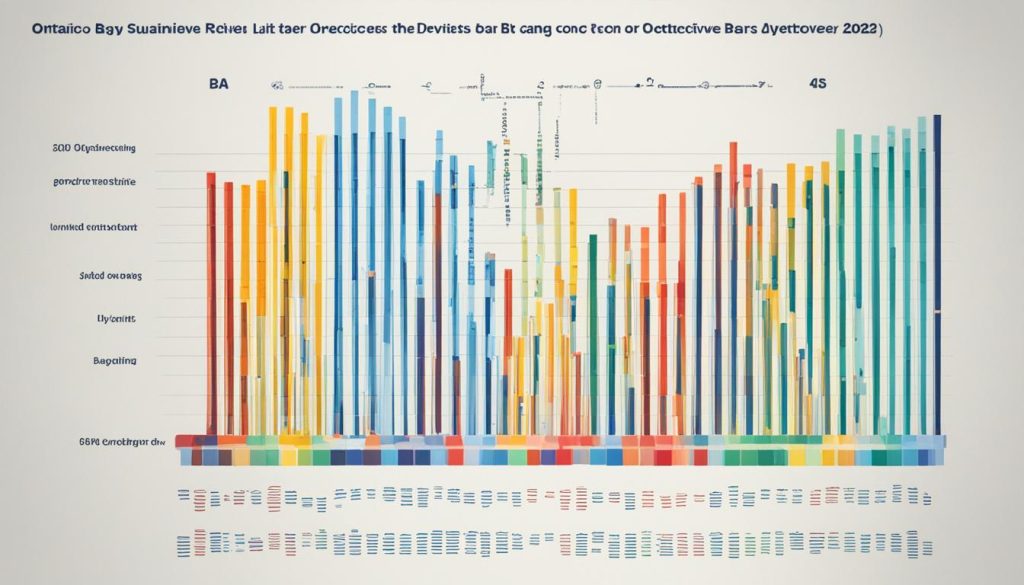Ontario Detective Salary Insights 2023
Did you know that police detective constables in Ontario earned over $100,000 in 2022? It’s true! According to the Ontario Public Sector Salary Disclosure – Sunshine List 2023, detectives from various towns such as Smiths Falls and Saugeen Shores received impressive salaries. For example, Bradley Walker from the Town of Smiths Falls earned $116,659.21 in 2022, while Laurel Hopkins and Gregory Fletcher from the Town of Saugeen Shores earned $114,146.18 and $110,833.88 respectively. These figures highlight the earning potential and competitive compensation rates for detectives in Ontario.
Key Takeaways:
- Detective salaries in Ontario can exceed $100,000 per year.
- Bradley Walker from Smiths Falls earned $116,659.21 in 2022 as a police detective constable.
- Laurel Hopkins and Gregory Fletcher from Saugeen Shores earned $114,146.18 and $110,833.88 respectively as police detective constables.
- These figures demonstrate the average pay and income levels for detectives in Ontario.
- Detective career earnings in Ontario are highly competitive and reflect the importance of their role in law enforcement.
Top Earners on the Ontario Sunshine List
When it comes to the top earners in the province, the Ontario Sunshine List for 2023 showcases the highest-paid employees in Ontario’s public sector. At the top of the list is Kenneth Hartwick, President and CEO of Ontario Power Generation, with a salary of $1,726,068.02 in 2022. This impressive income highlights the earning potential for executives in prominent positions.
In addition to Hartwick, other notable earners on the list are Dominique Miniere, Chief Strategy Officer, Michael Martelli, Chief Projects Officer, and Phil Verster, President and CEO of Metrolinx. With substantial salaries, these individuals exemplify the financial rewards that come with leadership roles in organizations like Ontario Power Generation and Metrolinx.

By disclosing the salaries of these top earners, the Ontario Public Sector Salary Disclosure provides transparency and accountability in the public sector. This information enables employees, taxpayers, and the public to have a deeper understanding of the highest salaries in Ontario. It also serves as a benchmark for salary comparisons and analysis within the public sector.
Salary Breakdown on the Sunshine List
The Ontario Sunshine List for 2023 provides valuable insights into the salary ranges of public sector employees in Ontario. The list offers a comprehensive breakdown of earnings in different salary categories, shedding light on the various compensation levels within the public sector.
Six-figure Salaries:
- Between $100,000 and $110,000: 120,253 employees
- Between $110,001 and $150,000: 109,320 employees
Higher Earnings:
- Between $150,001 and $200,000: 26,704 employees
- Between $200,001 and $250,000: 7,150 employees
- Between $250,001 and $300,000: 1,685 employees
Highest-Paid Employees:
- More than $300,000: 1,781 employees
The salary breakdown on the Sunshine List showcases the distribution of earnings among public sector employees in Ontario. It highlights the prevalence of six-figure salaries and reveals the highest-paid individuals in different salary categories.

| Salary Range | Number of Employees |
|---|---|
| $100,000 – $110,000 | 120,253 |
| $110,001 – $150,000 | 109,320 |
| $150,001 – $200,000 | 26,704 |
| $200,001 – $250,000 | 7,150 |
| $250,001 – $300,000 | 1,685 |
| More than $300,000 | 1,781 |
Proposed Changes to Employment Laws in Ontario
The Ontario government has introduced Bill 149, the Working for Workers Four Act, 2023, which aims to make significant amendments to various employment-related statutes in Ontario. This includes proposed changes to both the Employment Standards Act and the Workplace Safety and Insurance Act, addressing key areas of worker protections and fair employment practices.
Amendments to the Employment Standards Act
Under the proposed changes to the Employment Standards Act, employers would be required to include compensation information in publicly advertised job postings. This measure aims to enhance transparency and provide job seekers with crucial wage-related details upfront. Additionally, the bill seeks to prohibit the deduction of wages for unpaid customer bills, protecting employees from potential financial burdens.
The Working for Workers Four Act also recognizes the importance of pay transparency, ensuring that employees have access to information about their compensation. The bill proposes provisions to reinforce fair pay practices, highlighting the value of equal remuneration for work of equal value.
Furthermore, the proposed amendments address other crucial aspects of employment, including tips and gratuities, vacation pay, and the licensing requirements for temporary help agencies and recruiters. These changes seek to safeguard workers’ rights and promote fair employment standards across various sectors in Ontario.
Amendments to the Workplace Safety and Insurance Act
In addition to the proposed changes to the Employment Standards Act, Bill 149 also includes amendments to the Workplace Safety and Insurance Act. One notable amendment is the introduction of “super indexing” for Workplace Safety and Insurance Board (WSIB) benefits. This indexing mechanism would allow for increased benefits above the annual rate of inflation, ensuring that injured workers receive adequate compensation for their injuries and disabilities.
The bill also addresses specific compensation for firefighters and fire investigators by lowering the duration of employment required to receive presumptive compensation for esophageal cancer. This amendment acknowledges the risks and challenges faced by firefighters in the line of duty and aims to provide them with the necessary support and coverage for occupational diseases.
Moreover, while not directly addressed in Bill 149, the government’s extension of the licensing application timeframe for temporary help agencies and recruiters underscores their commitment to regulating these entities and protecting workers’ rights in the temporary employment sector.
| Proposed Amendments | Employment Standards Act | Workplace Safety and Insurance Act |
|---|---|---|
| Compensation information in job postings | ✓ | – |
| No deductions from wages for unpaid customer bills | ✓ | – |
| Enhanced pay transparency | ✓ | – |
| Protection for tips and gratuities | ✓ | – |
| Reinforcement of vacation pay provisions | ✓ | – |
| Licensing requirements for temporary help agencies and recruiters | ✓ | – |
| – | – | – |
| “Super indexing” for WSIB benefits | – | ✓ |
| Presumptive compensation for esophageal cancer in firefighters | – | ✓ |
Other Statutory Amendments and Future Developments
Alongside the proposed changes to the Employment Standards Act and the Workplace Safety and Insurance Act, Bill 149 encompasses amendments to other statutes, addressing crucial aspects of employment in Ontario. One significant amendment pertains to WSIB benefits, introducing the concept of “super indexing.” This provision aims to ensure that WSIB benefits can increase above the annual rate of inflation, enhancing the financial support provided to injured workers in the province.
In an effort to support firefighters and fire investigators, Bill 149 also proposes a reduction in the duration of employment required to receive presumed compensation for esophageal cancer. By lowering this requirement, the government aims to acknowledge the risks faced by firefighters and provide them with timely compensation, highlighting their dedication to public safety.
While not explicitly addressed in the bill, it is essential to mention that the government has extended the time frame for licensing applications for temporary help agencies and recruiters. This extension showcases the government’s commitment to establishing adequate licensing requirements for these industry professionals, emphasizing the need for fair and transparent recruitment practices and the protection of temporary workers’ rights in Ontario.
These proposed amendments and future developments within the employment laws of Ontario reflect the government’s ongoing commitment to fostering a fair and safe working environment. By continuously evaluating and enhancing employment statutes, the government aims to prioritize the well-being of workers and ensure their protection under the law. These legislative changes represent a significant step toward further empowering employees and bolstering the labor landscape in Ontario.
- The Role of Police in Community Safety & Unity - October 6, 2025
- Quebec Police Officer Salary Insights 2023 - July 13, 2025
- Canada Arrest Protocol: What Police Say Upon Arrest - June 12, 2025




















Post Comment